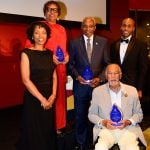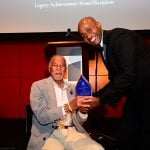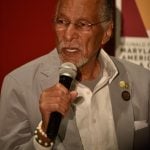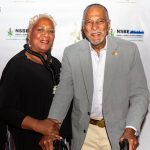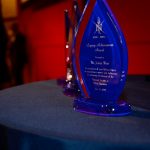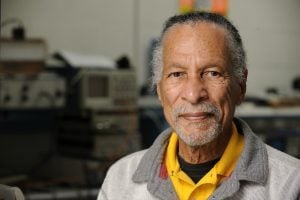
James West, a professor in the Department of Electrical and Computer Engineering, has been named as one of the inaugural recipients of the National Society of Black Engineers Baltimore Metropolitan Area Chapter (NSBE-BMAC) Legacy Achievement Award!
Per a statement from NSBE-BMAC, the Legacy Achievement Award is being given to individuals who have “made a substantial impact in the STEM arena either in academics, innovation or community service in Baltimore City or the surrounding areas.”
“The NSBE plays a vital role in the black community from the standpoint of attracting and mentoring young students into going towards an engineering career,” West said. “Diversity has been shown to have a great influence on the success of any engineering or scientific project. The NSBE wants to make sure that underrepresented minorities are not left out of the university scene, and so they encourage that part of the population that doesn’t readily participate in the STEM sciences.”
West has enjoyed a distinguished career with a combined 250 patents both domestic and internationally. This includes the Electret Microphone (EM), which he developed with Gerhard Sessler in 1962 as a member of Bell Laboratories. The EM is still used today in telephones and cell phones, as well as professional applications, in almost every device that requires a microphone including hearing aids. In fact, more than two billion EM’s are produced every year.
West has also taken it upon himself to help mentor the next generation of African-American engineers. He is the ECE department Diversity Champion, and is also on the Board of Directors for The Ingenuity Project, which offers a separate, comprehensive math and science curriculum for students in Baltimore City. The incoming class of freshmen at Johns Hopkins University this Fall will feature nine alums of The Ingenuity Project.
West has also been involved in a variety of initiatives coordinated at Johns Hopkins that pushes education for African Americans, including being a committee member for the Baltimore Scholars Program, which is a two-tiered financial aid program that recognizes high-achieving Baltimore City Public Schools graduates.
An additional aspect of West’s motivation for encouraging young African Americans is his own background. He admits that one of the main reasons for his successful career was having a great mentor, Lincoln Hawkins, during his early years. Now, he wants to do the same for the next generation of African Americans who are interested in STEM.
“I hope my experiences and advice will have value in shaping these students to be as productive as they possibly can be,” West said.
West was presented his award at the organization’s 30th Anniversary Awards Gala on June 22 at The Reginald F. Lewis Museum of Maryland African American History and Culture. Photos courtesy of Paul A. Greene.
